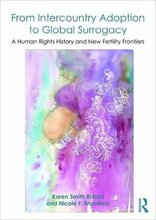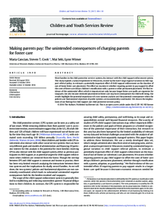Displaying 811 - 820 of 982
Extracting on chronologic data, this book discusses the politics and practice of intercountry adoption starting with the state international adoption to in the 1950s continuing to present-day adoption practice and protections.
The current study examined the impact of transitions on foster children’s adjustment to a new placement in out-of-home care in the US.
This study tests an intervention to improve child welfare outcomes for substance abusing families, specifically the probability of families achieving a stable (at least 12 months) reunification.
This research examines the long-term stability of legally permanent adoptive and guardianship homes for former foster youth.
A column from Journal of Adolescent and Adult Literacy reviewing two short films, which feature former foster care youths and their memories of the foster care system.
This article introduces a youth-reported measure (Essential Youth Experiences [EYE]) developed to assess the experiences of foster youth in their home environment and their critical relationships across a number of service systems.
According to this study, mothers who abuse substances are more likely to have impaired parenting and lose custody of their young children.
This study examines the causal role that the source of income plays in reunification.
This study examines whether requiring parents to pay child support to offset the costs of foster care delays children's permanent placement, whether through reunification with a parent, adoption, or guardianship.
This article is a discussion of the state of foster care for children with disabilities. This study explores three areas related to foster care outcomes: 1) previous disrupted or dissolved adoptions among youth with and without intellectual disabilities; 2) demographic or disability related disparities of youth with intellectual disabilities who were and were not discharged from care; and 3) foster care outcomes of youth with and without intellectual disabilities.


